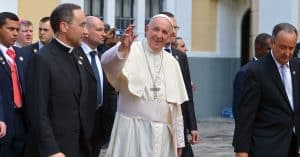Trump Administration Plans Possible Pardons for January 6 Protesters
As President-elect Donald Trump prepares to be sworn in, his administration is focusing on the contentious issue of pardoning individuals involved in the January 6 protests.
The incoming administration is evaluating potential pardons for January 6 demonstrators, prioritizing fair treatment and addressing multiple governance challenges.
President-elect Trump has signaled his intent to issue pardons for January 6 protesters as early as his first day in office. These plans have sparked debate considering the distinction between peaceful protestors and those who committed acts of violence. Vice President-elect JD Vance has articulated the administration's commitment to ensuring equitable legal treatment in these cases.
JD Vance Addresses Pardon Considerations
JD Vance recently clarified the administration's plans, stating that those who protested peacefully deserve reconsideration of their legal treatment. “If you protested peacefully on January 6th,” Vance mentioned, “you should be pardoned.” He emphasized the commitment to fairness, noting that violence on that day would alter the administration's stance on pardoning anyone involved.
On his part, Trump expressed a broad review strategy, stating, "I’m going to look at everything," indicating an individualized approach to potential pardons, with a promise of swift action upon taking office. This approach highlights the complex nature of decisions faced by the new administration.
Challenges for Disaster Relief and Governance
Beyond the issues surrounding January 6, the new administration faces a myriad of challenges, including a border crisis, tensions in the Middle East involving hostages, and domestic issues around disaster relief. JD Vance has highlighted the administration's dedication to improving disaster response capabilities. "We just have to do a better job," Vance remarked, emphasizing his commitment to effective governance.
Southern California presents an immediate challenge, with ongoing wildfires exacerbating existing political tensions. Vance criticized California’s governance, suggesting mismanagement and dry conditions as factors contributing to the severity of the fires. These critiques set the stage for potential policy clashes with California’s leadership.
Tensions With California's Governance
Responses from California officials have been critical of the incoming administration’s attack on state policies. The Governor of California’s press office rebuffed claims regarding water management issues, stating there is "no water shortage" currently impacting Southern California, despite Trump’s assertions. This dispute underscores the broader challenges the administration may face in coordinating disaster relief efforts amidst political differences.
As the administration navigates these challenges, JD Vance remains vocal about the need for "competent governance." He attributed the worsening fire crisis to a "serious lack of competent governance" in California, marking a pointed critique of the state's crisis management strategies.
Trump’s Critique and Broader Implications
President-elect Trump's critiques have not only focused on disaster management but also on the workings of congressional committees, particularly those investigating January 6. Trump has described the congressional body focused on these events as misguided. This reflects ongoing tensions between the incoming administration and legislative oversight bodies.
Trump’s administration, poised to begin in just over a week, also plans to address broader humanitarian issues as they shift focus to governance and policy improvement. These plans highlight a commitment to adapting to emerging challenges while maintaining a stance grounded in their campaign promises.
Navigating the Complexity of Pardons and Policies
The complexity of the pardoning process adds another dimension to the starting agenda for Trump and Vance. As discussions unfold over the next few days, the administration’s approach to legal cases from January 6 will likely serve as a litmus test for their broader approach to justice and governance.
Despite the contentious nature of these plans, the administration is signaling a willingness to engage in difficult conversations and actions necessary to chart a new course. Balancing these pardons with other policy initiatives may prove to be one of the administration's early tests of strategic governance.
Future Outlook of the Incoming Administration
As the inauguration approaches, it remains to be seen how Trump and his team will manage these multifaceted issues. With significant national and international matters on the horizon, the administration's ability to effectively prioritize will be critical.
This period represents both an opportunity and a challenge for the Trump administration, as they aim to establish a coherent policy framework that addresses the diverse needs of the American populace. The upcoming weeks will no doubt be watched closely, as decisions in these early days could shape the political landscape for years to come.




